

Empathy and Why It's the #1 Leadership Skill. Craig Irons: Hello, again, and welcome to the Leadership 480 Podcast from DDI.
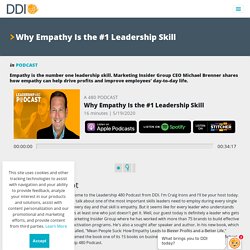
I'm Craig Irons and I'll be your host today. With our time today we're going to talk about one of the most important skills leaders need to employ during every single one of the 480 minutes they have every day and that skill is empathy. But it seems like for every leader who understands the importance of empathy, there's at least one who just doesn't get it. Well, our guest today is definitely a leader who gets it. Michael Brenner is the CEO of Marketing Insider Group where he has worked with more than 75 brands to build effective content marketing and employee activation programs. Micheal Brenner: Craig, thanks so much for having me. Craig Irons: So I want to start by diving into something that you bring up right at the outset of your book and your book is fantastic by the way, which is that you have held 53 jobs and that inspired me to sit down and actually make a list of all the jobs I've held.
The Importance of Empathy in Challenging Times - Amy Castro. Whether you chose to work remotely or you’ve been thrust into the world of “telecommuters” by world events or changes in your business or industry, trying to manage a remote team brings challenges to even the most experienced leaders.
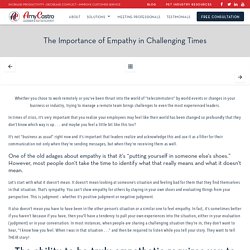
In times of crisis, it’s very important that you realize your employees may feel like their world has been changed so profoundly that they don’t know which way is up . . . and maybe you feel a little bit like this too? It’s not “business as usual” right now and it’s important that leaders realize and acknowledge this and use it as a filter for their communication not only when they’re sending messages, but when they’re receiving them as well. One of the old adages about empathy is that it’s “putting yourself in someone else’s shoes.” However, most people don’t take the time to identify what that really means and what it doesn’t mean. Let’s start with what it doesn’t mean. Empathy isn’t easy. Put aside your own opinions, values, judgments and experiences. Empathy at Work—Why it (Really) Matters.
“Don’t be so sensitive.”
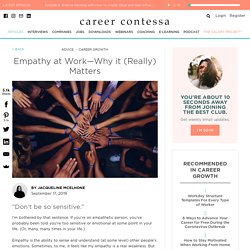
I’m bothered by that sentence. If you’re an empathetic person, you’ve probably been told you’re too sensitive or emotional at some point in your life. (Or, many, many times in your life.) Empathy in Times of Crisis - The Beryl Institute - Improving the Patient Experience. We are facing a critical time of fear and uncertainty with the invasion of the novel Corona virus on the world stage, when healthcare organizations are scrambling to keep patients and workers safe, informed and calm.
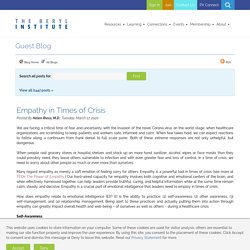
When fear takes hold, we can expect reactions to follow along a continuum from frank denial to full scale panic. Both of these extreme responses are not only unhelpful, but dangerous. When people raid grocery stores or hospital shelves and stock up on more hand sanitizer, alcohol wipes or face masks than they could possibly need, they leave others vulnerable to infection and with even greater fear and loss of control. In a time of crisis, we need to worry about other people as much or even more than ourselves.
Many regard empathy as merely a soft emotion of feeling sorry for others. 3 Ways Increasing Your Empathy Makes You a More Effective Leader. Research shows empathetic leaders foster more productive, engaged and innovative teams.
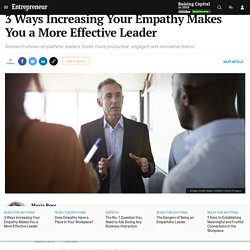
March 8, 2019 9 min read Opinions expressed by Entrepreneur contributors are their own. Years ago, I worked for a high-performing regional marketing team for a global company. We kept sales pipeline full to three times quota. We supported reps with both strategic and tactical efforts. Then one day, our fearless VP left for another opportunity. A new VP finally arrived, and we were impressed with this person's expertise and excited about what we could learn. Related: How to Transform Your Culture From Toxic to Peak Performance These were smart, proactive performers who were often courted by recruiters.
Leadership is about expertise and ability, to be sure, but it is just as much about emotional intelligence and interpersonal relationships. Author and leadership expert Simon Sinek says that empathy is crucial to successful leadership. We are wired for empathy. 1. 2. So practice active listening. 3. Empathy. Leader Empathy: The Key to Effective Relationships. In my article on Positive Outlook, I quoted a senior manager at a large US hospital network who described how mindfulness helped her minimize negative reactions to workplace experiences.

This included an ability to remind herself that she was often not fully aware of the needs and motivations of others, and therefore should not rush to judge their intentions. Like the other 41 leaders I interviewed, her in-depth discussion of this topic showed an improved capacity for the Emotional and Social Intelligence (ESI) Competency of Empathy. Empathy is one of the Social Awareness competencies in the twelve-competency Leadership Competency Model developed by Daniel Goleman and Richard Boyatzis. Empirically linked to leadership performance, Empathy is present in leaders with an understanding of the motivations of others, and the ability to relate to differing perspectives. Cognitive vs. Emotional Empathy with Daniel Goleman. Three Kinds of Empathy: Cognitive, Emotional, Compassionate.
Being cool in crisis seems essential for our being able to think clearly.
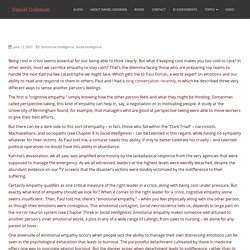
But what if keeping cool makes you too cold to care? In other words, must we sacrifice empathy to stay calm? That’s the dilemma facing those who are preparing top teams to handle the next Katrina-like catastrophe we might face. Which gets me to Paul Ekman, a world expert on emotions and our ability to read and respond to them in others.
Paul and I had a long conversation recently, in which he described three very different ways to sense another person’s feelings. The first is “cognitive empathy,” simply knowing how the other person feels and what they might be thinking. But there can be a dark side to this sort of empathy – in fact, those who fall within the “Dark Triad” – narcissists, Machiavellians, and sociopaths (see Chapter 8 in Social Intelligence) – can be talented in this regard, while having no sympathy whatever for their victims.